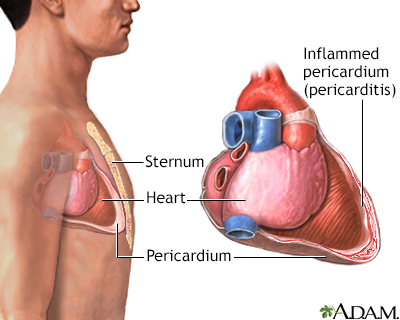Pericarditis
Pericarditis is a disorder caused by inflammation of the pericardium, the thin, sac-like membrane that surrounds the heart. Pericarditis can be caused by bacterial, fungal, or viral infections. It may also result from vascular inflammation (vasculitis), kidney or thyroid diseases, tumors, and injury or trauma to the chest, esophagus, or heart. In many cases, the cause is unknown. Pain occurs as a result of the layers of the inflamed pericardium rubbing against each other.

Review Date:
8/5/2019
Reviewed By: Gordon A. Starkebaum, MD, MACR, ABIM Board Certified in Rheumatology, Seattle, WA. Also reviewed by David Zieve, MD, MHA, Medical Director, Brenda Conaway, Editorial Director, and the A.D.A.M. Editorial team.
Reviewed By: Gordon A. Starkebaum, MD, MACR, ABIM Board Certified in Rheumatology, Seattle, WA. Also reviewed by David Zieve, MD, MHA, Medical Director, Brenda Conaway, Editorial Director, and the A.D.A.M. Editorial team.
The information provided herein should not be used during any medical emergency or for the diagnosis or treatment of any medical condition. A licensed medical professional should be consulted for diagnosis and treatment of any and all medical conditions. Links to other sites are provided for information only -- they do not constitute endorsements of those other sites. No warranty of any kind, either expressed or implied, is made as to the accuracy, reliability, timeliness, or correctness of any translations made by a third-party service of the information provided herein into any other language. © 1997-
A.D.A.M., a business unit of Ebix, Inc. Any duplication or distribution of the information contained herein is strictly prohibited.
